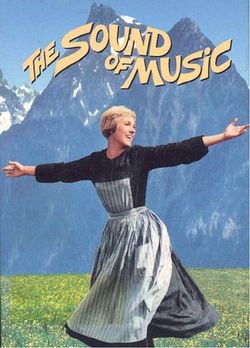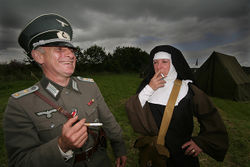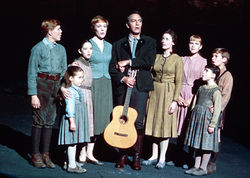The Sound of Music
| The Sound of Music | |
|---|---|
 A Traditional Austrian Tale of Sex, Religion and Nazis. | |
| Written by | Rogers & Hammerstein |
| Starring | Julie Andrews |
Release date | 1965 |
The Sound of Music (also known as The Sound of Mucus) is a 1965 movie based on Justine by Marquis de Sade and the Broadway show of the same name written by Richard Rogers and Oscar Hammerstein. The story is loosely based on the real life story of the Von-Trapp family singers who were the Jackson 5 of their day. Living in Australia, their father suffered from a delusion that he was a naval officer of a country with no coastline. He dodges the draft by disguising himself and his family as musicians. They set about a successful career with sickly sweet harmonies on stage, juxtaposed with back stage problems of domestic violence, drugs and alcohol abuse. The plot evolves around Maria, an annoying innocent christian girl, who gets passed down the hands of sexual maniacs. The stage show and film only hint at these dark times and the dark undertones (for example, involving goats) are often missed by the casual observer due to the cheery tempo abundant major chords of the score.
It is the third highest grossing (i.e. gross-out) movie of all time behind Star Wars and Legally Blonde 2: Red, White & Blonde. The success of the Sound of Music is particularly surprising given the characters’ habit of bursting into song for no apparent reason, something that in the real world lead to one being locked away in special hospitals for the mentally interesting. However, as a concept in film making, the so-called “musical” is very lucrative. These musicals, particularly The Sound of Music, are mostly popular amongst homosexual males and single women in their late twenties upwards.
Characters[edit | edit source]
Maria Von Trapp
Maria is the innocent, butter-wouldn’t-melt lead role played by Julie Andrews. She is introduced as a young woman on the verge of taking her holy vows to become a nun when she is sent away to become a governess for a gaggle of unruly children where she becomes involved with Captain Von Trapp. The character contributes to the debate, “Julie Andrews: Would You?” Scholars maintain that she does look cute, albeit old fashioned, but lacks the naughty glint in her eye she has in Mary Poppins which leaves no one in doubt that Bert has well and truly swept her chimney. Other academics however have cited her going topless in 1981 film S.O.B and consider that it is like walking in on one's mother whilst she is changing. It's a tough one.
Captain Georg Von Trapp
The authoritarian Austrian widower who’s ideas of child rearing are based on military discipline with all its associated sexual violence and punish beatings. He is shown to soften during the course of the plot by the playing of soothing music although the dark behaviour is never far from the surface.
The Von Trapp Children
There are seven Von Trapp children who are (youngest to oldest) Gretl, 5, Marta, 7, Brigitta, 10, Kurt, 11, Louisa, 13, Friedrich, 14, Liesl, 16. They are surprisingly good at singing considering that none are supposed to have had any exposure to music before Maria showed up. It is speculated that Gretl and Marta were a product of Captain Von Trapp’s abuse of oldest daughter, Liesl.
Max Detweiler
Max is a close friend of Captain Von Trapp and is constantly on he look out for musical acts he can exploit, much like the modern day Simon Cowell.
Baroness Elsa Schraeder
The Baroness is Captain Von Trapp’s other love interest. She is often misunderstood as a bitch who wants to sabotage Maria and the Captain’s blossoming relationship so she can move in on him and pack the kids off to boarding school. In reality, her main motivation in sending the children away was to remove them from their abusive father.
Rolf
A little bastard of a character who begins as a messenger boy but eagerly rallies behind the Swastika. As is common with the children of abusive parents to find themselves in relationships with equally abusive partners, Liesl Von Trapp misguidedly falls for the erstwhile Nazi.
Nuns
Dress in black and white, and have Catholic tendencies. The Nuns act as Church Ladies, therefor they are very religious. They are estimated to comprise nearly 88% of the weekly churchgoing population. Nuns seem to agree that they primarily exist to accost any newcomers with endless questions about their hobbies, economy, sex, love lives, and financial histories.
The two classifications are Veteran and In Training. Veteran Nuns are composed of women who are 70+ years of age. Some people believe that the nuns are merely attempting to make the guests "feel welcomed" upon entry. Noted for their fierce nature, headscarves, solid three yard long oak rulers (along with their ability to use these as effective wooden leathered paddles), these can be among the most fiery and aggressive nuns, and should not be provoked. They are matriarchs in the social hierarchy of the church, responsible for the handing down of the sacred traditions to the younger generations. Higher social status may be indicated by aging, wrinkles, many of which exceed education. Money may also help to satisfy the church nuns, and using large sums to satiate the ladies and thus to protect the church from their attacks. The Head-Nun is an 80-year old woman who is an extremely strict mistress.
In Training are those young ladies whom the Veteran Nuns ladies slowly put through the initiation (a long and rigorous process), so that they will be able to assume the role of the Veteran Nuns ladies in the future. They are often not as intrusive as the veterans (Almost all are though.), but will instead follow the older members of the pack to learn by observation.
Plot[edit | edit source]
The story begins with Maria frolicking in a mountain meadow when she should be at prayer in the convent. She spins around singing the title track, “The Sound of Music”. The nuns, irritated at Maria’s increasingly problematic behaviour sing “How do you solve a problem like Maria?” As has always been the way in the Catholic Church, the answer to a problem is not to address it directly but to move the offender away and hope it gets better.
Maria is sent to become the new Governess for Captain Georg Von Trapp’s seven children (seven being symbolic of the Judo-Christian concept of ‘Seven Deadly Sins’). Rumours of Von Trapp’s quick temper were rife and Maria attempts to steel herself against the challenges ahead by singing “I have Confidence”.
Upon arrival at the Von Trapp household, the Captain marches his children out with military precision, dressed in pseudo-military uniforms. It is clear from the look in their eyes that the last vestiges of childhood are slowly ebbing away. Like many children from dysfunctional families, they have behavioural problems which has explained the high turn-over of governesses. After the initial dinner together, oldest daughter Liesl meets with messenger boy Rolf which leads to the duet of “Sixteen going on Seventeen.” It is apparent at this point that there is something not quite right with Rolf because Liesl is quite hot and she is throwing herself at him but he doesn’t seem interested. Suspicious indeed.
Following Liesl sneaking back into the house, a thunderstorm erupts. The storm is intended to be representative of Captain Von Trapp’s dark temper and Maria calms the children by singing “My Favourite Things” to teach them that singing can be a way of mentally escaping the abuse.
Maria gradually bonds with all of the children. She dresses them in clothes made from curtains so that they blend in with the soft furnishings of the house in the hope that their father will not see them on one of his drunken rampages. She develops their musical education teaching them “Do-Re-Mi”. In this song, Richard Rodgers clearly ran out of ideas when it come to describing the note ‘La’, only being able to come up with “La, a note to follow So.” Very lazy song writing.
Maria and the children are caught frolicking by their father who is apoplectic with rage. Having just returned to the house with his lady friend the Baroness Elsa Schraeder and showbiz agent Max Detweiler, he is ready to send Maria back to the convent but then hears the children singing “The Sound of Music” for Max. This reignites a spark of humanity in Captain Von Trapp and can be seen as the start of his redemption. Max wants to put the children in to the Salzburg music festival but the Captain is resistant. He does change his mind about Maria staying knowing that his behaviour is wrong and recognising that Maria’s musical influence is therapeutic. Maria and the children put on a puppet show for the Captain and his friends featuring the song, “The Lonely Goatherd”. This features yodelling, second only to the music you find in Indian Restaurants as the most irritating musical form. Even the Captain joins in on the singing with a rendition of “Edelweiss”.
At a later ball held in the Von Trapp home, the Baroness, concerned that Maria could be an enabler for the Captain’s bad ways convinces her to return to the convent. The children, unawares are sent to bed, singing “So Long, Farewell”. Bed times, like any other simple task become unnecessary long and drawn out affairs when used in musicals.
Maria returns to the convent much to the dismay of the nuns who have only just managed to clean up the mess her dalliances caused last time. The Mother Superior convinces Maria to return to the Von Trapp’s with “Climb Ev’ry Mountain”, a metaphor for sleeping around when your young before settling down. Maria returns and finds that Captain Von Trapp is engaged to be married to the Baroness; however, during the song “Something Good”, Maria alludes to what she will let the Captain do to her if he chooses her. Knowing the Baroness would never let him do that, he plumps for Maria and marries her. He becomes a changed man and puts his abusive ways behind him. Whilst on honeymoon, Max enrols the children into the Salzburg festival. Meanwhile, the the Third Reich has annexed Austria and Liesl’s love interest Rolf has become a Nazi and rejects her, confirming the viewer’s suspicion that there was something not right about him.
The Captain and Maria return from their honeymoon to find that he has been called up to join the German Navy. Surprisingly, the Captain is very much anti-Nazi and they decide that they will use the performance at the music festival to cover their escape to Switzerland.
Deleted Scenes and Alternative Ending[edit | edit source]
“How Do You Solve A Problem Like Maria?”[edit | edit source]
The final cut did not shed much light on what problems exactly were being caused by Maria but in an earlier version of the song, the nuns essentially discuss about how Maria fell pregnant to a visiting bishop and the subsequent back street abortion.
“My Favourite things”[edit | edit source]
Before the thunderstorm, the children confide in Maria that their mother died following lots of shouting from the Captain. The official line that she fell down some stairs was never questioned due to the Captain’s standing in the community. Maria brushes over these concerns as those of an active imagination and begins singing, “My Favourite Things”.
“So Long, Farewell”[edit | edit source]
After the children have sang themselves to bed and the ball ends, Captain Von Trapp is in a rage about Maria’s departure. He is seen to be visibly drunk, bursting into the girls room with a bottle of champagne in hand. He sits down on Liesl’s bed saying, “So you wanna taste your first Champagne do you, yes?” and forces the bottle into her mouth. The camera pans away to Louisa, her back turned away from the grotesque tableau feigning sleep knowing one day, she may be next. The scene ends with the sound of Liesl humming a reprise of “My Favourite Things” between sobs.
Alternative Ending[edit | edit source]
As the Von Trapp family attempt escape, the nuns, in what is a more accurate portrayal of the Catholic Church’s cooperation with the Nazis, assist the pursuing soldiers rather than in the primary ending when they help the family by sabotaging the soldiers’ cars. Captain Von Trapp is seen being placed in a car and whisked away while his family are forced into the back of an army truck. A montage ensues during which we learn that as punishment for his attempted desertion, Captain Von Trapp is stripped of his rank and titles and forced to join the army. Russian soldiers are seen happening upon the frozen body of Von Trapp somewhere on the Eastern Front. Finally, we see Maria’s body being thrown into a mass grave and covered with lime in a forced labour camp. The final scene is set to a sombre adagio arrangement based on the main “Sound of Music” theme.
There have also been several versions of the sound of music,whereby the main character is actually a paedophilic individual, that changes her ways and becomes socially 'normal' (yes she does have 6 fingers afterwards after suffering radioactive superpowers) but she does become accepted. However she later gets attacked by children, such aroon who tries to hit her on the head with a baseball bat, she retaliates and the fight lasts forever, all of time and space revolves around them, consuming all matter into one singularity, the TARDIS gets stuck here,this creates a paradox and suddenly the world explodes..luckily they survive and the world comes back into existence again. 3 years later she starts singing the sound of music theme song, and suddenly several zombies run at the speed of light into her, tearing her apart. She's dying! Then, she is about to regenerate..saying her last words before her regeneration (and indeed this is the last time she is seen before she leaves Earth to terraform mars): "I'm dying..but I can fix that!". The account isn't that supportable as it was told by a random tramp in an alleyway
Legacy[edit | edit source]

Over time, the dark sub-plot of The Sound of Music has been lost amid the jaunty songs and Julie Andrews' perfect smile. This however was brought to the fore during the trial of Josef Fritzl, the Austrian incestuous rapist who kept his daughter and their offspring locked for many years in a home-made dungeon. During his trial, he cited Captain Von Trapp as his inspiration for all his terrible deeds.
The Sound of Music is also popular in England with fans who attend events called "Sing-A-Long-A-Sound-Of-Music" held up and down the country. The film is showed with the lyrics scrolling along the bottom of the screen in a karaoke style. The main reason for most attendees is to openly indulge in their fetish of dressing up as nuns and Nazis, something usually confined to private. These events usually decline into a debauched orgy with discarded habits and swastika armbands littering the premises



